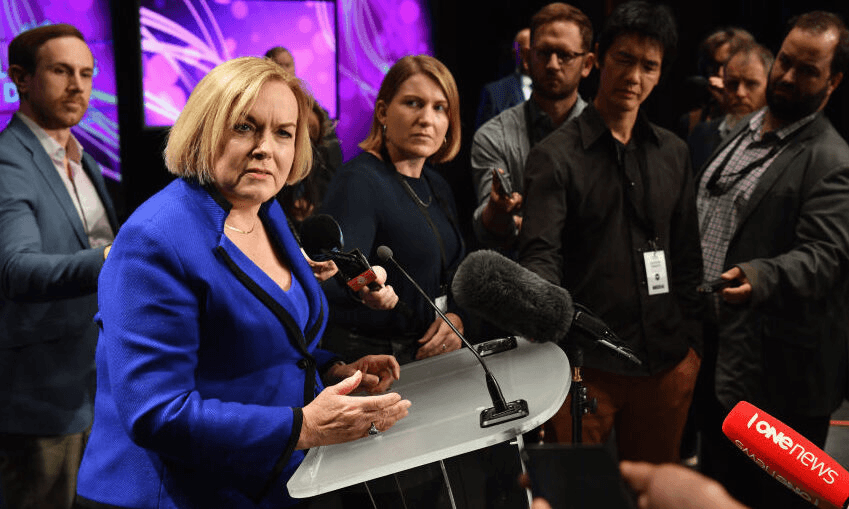In a chaotic 90-minute contest, the crowd made itself heard, writes Justin Giovannetti from Christchurch.
At several points I had no idea what the leaders were saying. Hundreds in the Christchuch crowd were cheering on Labour leader Jacinda Ardern while a row of National supporters seated in front of me grumbled.
Ardern was making her closing statement. “I consider New Zealand very lucky and all of us very lucky to be here,” she told the 750 people seated in the James Hay Theatre, where not a mask was in sight. Then all I heard were snippets through the din.
A raucous crowd
The debate was a chaotic 90-minute contest. The crowd made itself heard: heckling, booing and interrupting where it saw fit. Both leaders seemed to feed off the energy, with Ardern noting afterwards that the impromptu town hall had changed the exchange for the better. National leader Judith Collins more often found herself at odds with the assembled Cantabrians, debating the hecklers as well as her Labour opponent.
Early on, Collins attacked her opponent’s record on Covid-19. National, she said, had been stronger in its demands to close the border and mandate face marks. Then she pointed to Sāmoa and said the country had moved earlier and harder than New Zealander. Ardern said it hadn’t.
“Don’t disrespect Sāmoa,” snapped Collins. The crowed booed loudly. The National leader was heckled. The moderators from Stuff stepped back. That set the tone for the evening.
Sāmoa went into lockdown on March 26, a day after New Zealand entered level four. Speaking with reporters after the debate, Collins said she meant that the country had introduced some travel restrictions before New Zealand. Sāmoa did begin to restrict flight volumes in February. Whether that’s hard and early will be left to the voters. Christchurch wasn’t buying it.
A tough day for National
National came into the debate bloodied after infighting erupted in the open earlier today, with leaked emails from parliamentarians angry that Collins was making policy decisions without speaking to them. The Labour leader knew it, putting in a dig in her final words: “When parties are focused on themselves they can lose sight of what matters.”
The leaders agreed on the need for fluoride, building more homes and the vague sense that New Zealand could eventually become a republic.
The Christchurch debates, which began in 2011 after the earthquakes, have a reputation for being free-flowing and this was no different. The moderators promised to be hands off and, at most, kept one hand lightly on the wheel.
The one area where the rivals’ disagreements were stark was around the environment and climate change. Ardern called for New Zealand to do more to clean up its rivers and lower its emissions. Collins said her key to solving climate change would be technology, by creating more jobs that don’t increase emissions. She turned most questions about climate change into an answer about the economy. The generational crisis isn’t the rising seas, the National leader argued, but growing debt and unemployment.
A tense atmosphere beforehand
The unruly atmosphere wasn’t just in the building.
A small throng of climate protesters unfurled banners outside the debate. With megaphones they chanted about the looming end of the world from climate change and the inaction of the two major party leaders. A woman dressed in a bee costume acted as though she’d been killed by the changing climate.
There was a conspicuously heavy police presence, near the protest and eventually within the debating hall.
The venue itself was protected by a ring of overzealous private security guards. As often happens with bored young security guards, their gaze soon fell on the media milling about.
With the protest going on, I tried to enter the debate venue. I was stopped at first because I brought a water bottle. I was told the bottle was a security risk. Just inside, I spotted a few MPs drinking glasses of beer. Two private security guards blocked my way. Because it’s a very nice metal bottle, I went off to hide it in a bush near the venue.
On my return to the front doors, I got into a prolonged argument with a security guard about whether I was really a journalist. Why? Because I had my gear in a backpack. The guard told me that real journalists carry leather bags or briefcases. She eventually relented. There were more arguments. It took me a half hour. American airport security is a much more pleasant experience.





